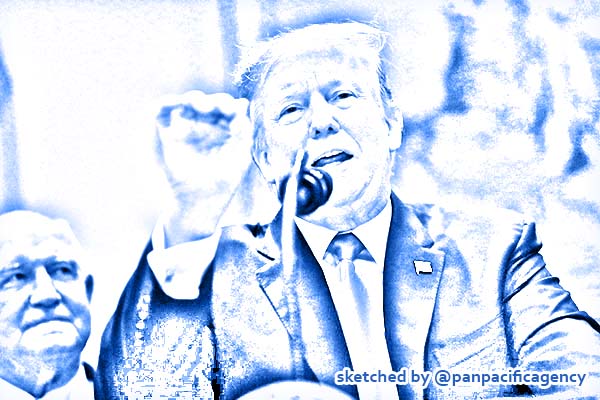[Analytics] Trump’s whiplash diplomacy on Taiwan

US President Donald Trump speaks at the White House. Photo: Reuters. Sketched by the Pan Pacific Agency.
Beginning in Jan. 2017, the Trump Administration made great strides in America’s relationship with Taiwan during its time in office, bringing the two countries much closer together than they have been in more than 40 years through increasing bilateral exchanges, strengthening defense ties and undertaking arms sales. Robert Eldridge specially for the The Japan Times.
Symbolic of this progress, for example, Secretary of State Mike Pompeo recently announced the lifting of self-imposed restrictions on interactions between U.S. and Taiwanese officials. In a statement released on Jan. 9, Pompeo said, “Taiwan is a vibrant democracy and reliable partner of the United States, and yet for several decades the State Department has created complex internal restrictions to regulate our diplomats, servicemembers, and other officials’ interactions with their Taiwanese counterparts. The United States government took these actions unilaterally, in an attempt to appease the Communist regime in Beijing. No more.”
Related to this decision, U.S. Ambassador to the United Nations Kelly Craft was scheduled to visit Taiwan from Jan. 13 to 15 to meet with her counterparts for what would have been the first official interaction at that level since the Republic of China was replaced in the U.N. by the People’s Republic of China in 1971.
However, on the eve of her departure, Craft’s trip was suddenly canceled due to the “upcoming presidential transition.” It is unclear what took place with the whiplash-like turnaround.
Those close to the incoming Joe Biden administration had said that it “will rightly be unhappy that a policy decision like [the lifting of the restrictions] was made in the final days of the Trump administration.” Perhaps the cancellation was related to this unhappiness, or interference by the PRC.
In any case, this was a very odd statement on many levels, revealing inadvertently the soon-to-be inaugurated administration’s pro-China bias. The lifting of the restrictions would have strengthened bilateral relations and helped to reduce Taiwan’s diplomatic isolation, the latter being a policy pursued by the PRC since its founding more than 70 years ago.
In any case, if Biden really supported Taiwan — as his circle has tried to have us believe — but is unable to make such a decision himself due to his overly close ties to the Chinese Communist Party, it is good that Trump did the heavy lifting for him. If only his six Democratic or Republican predecessors had done it earlier.
The “lateness” of the policy announcement may have been related to the simple fact that Trump believed he would be reelected. And once this corrective measure was in place regarding interactions, it is likely that there would have been a dramatic increase in visits to include Cabinet-level or higher.
In this sense, the sudden cancellation of Craft’s visit, like that for Environmental Protection Agency Director Andrew Wheeler which had been scheduled for December but stopped for “budgetary reasons” and a renewed focus on domestic priorities, were blows to Taiwan and apparent victories for the CCP.
Fortunately, there had been increasingly high-level visits to Taiwan taking place during the Trump years, including that of Secretary of Health and Human Services Alex Azar. He visited Taiwan in the first half of August last year to pay his respects following former President Lee Teng-hui’s passing on July 30. Azar took advantage of his four-day stay to learn about Taiwan’s highly praised COVID-19 response, sign a memorandum of understanding and meet with experts and senior leaders, including President Tsai Ing-wen. He was reportedly the highest-level member of the U.S. government to officially meet with Taiwanese representatives since the two countries broke relations in 1979.
One month later, Undersecretary Keith Krach attended President Lee’s state funeral, sitting next to former Prime Minister Yoshiro Mori of Japan, who attended both August and September’s events, and relayed a message from the new prime minister, Yoshihide Suga.
Former Prime Minister Shinzo Abe could have attended at least the funeral, considering how close he and his family personally have been with Taiwan over the past seven decades. President Trump should have attended as well. Because it was the middle of the presidential election, it is understandable why he would not have been able to attend, but at least Vice President Mike Pence could have participated instead.
Despite the advances the Trump administration made with Taiwan, it left two important actions incomplete, which makes his electoral defeat unfortunate for supporters of Taiwan. First was the realization of an official presidential visit. And second is the reestablishment of formal diplomatic relations — in other words, recognizing Taiwanese statehood. Many people throughout the Indo-Pacific region had hoped for these actions. One such outspoken person is the Japan-based best-selling author and commentator from Taiwan, Koh Bunyu, who gave a similar interview in the Japanese media late last year.
Moreover, many people around the region felt let down by the inexplicable cancellation of Craft’s trip to Taiwan. One close friend from Hong Kong wrote to me when she heard the news, “Everything Pompeo did will be undone soon.” Normally not political, she was clearly worried about the future.
As she should be. “Today’s Hong Kong will be tomorrow’s Taiwan,” goes the expression in the region. Some add a corollary: “And the day after is Okinawa and Japan.” The incoming Biden team should understand this point, but they appear not to or choose not to.
Robert Eldridge is the former political advisor to the U.S. Marine Corps in Japan and the author of the recent “Twenty Years of the Okinawa Problem.”